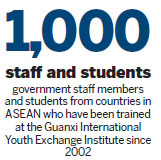ASEAN students learn about China





Southern region a training base for young visitors
Thousands of young people from Southeast Asia have gained a more objective knowledge of China thanks to South China's Guangxi Zhuang autonomous region.
The region, which borders Vietnam, has become a training base for the younger generation from Southeast Asia, with its universities and official institutions offering a variety of programs.
The Guangxi International Youth Exchange Institute has trained more than 1,000 government staff members and students from countries in the Association of Southeast Asian Nations since the institute was founded in 2002, said Feng Junjian, a teacher in charge of communications at the institute.
The institute's 30th Senior Study and Research Program for International Young Cadres opened on Wednesday in Nanning, capital of Guangxi, with 42 young leaders from Brunei, Malaysia, Indonesia, Singapore and Thailand attending the training program.
Liang Cunyi, a teacher in charge of the training class at the institute, said the young visitors will study Chinese politics, economics and culture and visit some project sites, including industrial parks. "The training can help them learn more about China. For instance, we have classes especially to explain the policy of China's reform and opening-up", Liang said.
The Secretariat of CAEXPO, an annual exhibition for enterprises in China and ASEAN countries held in Guangxi, also offers training programs for officials from ASEAN members.
Liang Yiguang, assistant secretary-general in China-ASEAN Expo secretariat, said: "So far, we have four training programs for officials from ASEAN countries - in trade, business reporting, investment and exhibitions.
"We hope to strengthen the development of the China-ASEAN free-trade area through the training, during which the ASEAN officials will learn more about Chinese policies so they can attract more Chinese investment to their countries."
He said there is a gap between the "real China" and how people from ASEAN countries perceive China, using as an example two Vietnamese trainees in a program last year who were amazed at the value of exports from a single industrial park in Suzhou, Jiangsu province.
Dian Lestari, a 22-year-old Indonesian trainee majoring in international relations, said: "My impressions of China have become more objective due to the training, which offers us insights into modern China."
She said this practical understanding of China will help a lot if she becomes a foreign affairs official.
During her stay in China, she has had the chance to become familiar with the daily routine of locals.
Her classmate, 17-year-old Izzati Ahamad from Brunei, said she never imagined China's population was so large until she saw the crowded streets in Nanning.
"I'll certainly share my experience in China with my friends, which will improve their understanding of the country," she said.
She said she expects to learn from the training program how China has achieved such dynamic development, and she will tell people in her country how to do business with China.
Liang, the teacher at the institute, said: "After visiting China, most young leaders have changed their misunderstanding of the country."
Meanwhile, the training program is also helping professionals do business with China.
Veasna Mao, a Cambodian officer from the Ministry of Commerce, who organizes international exhibitions, said:"I've learned good lessons from successful exhibitions in China.
"Then, I apply my learning to Cambodia as well. ... At the moment, we are applying some good practices that China has. ... We've received good results from doing so, so we still keep learning from China on organizing exhibitions."
Anongsri Kanaprom, a 27-year-old Thai student, is studying Chinese at Guangxi University for Nationalities.
"Many people in Thailand are eager to learn Chinese, as relations between China and Thailand have become closer," she said.
Contact the writers at huangfeifei@chinadaily.com.cn and zhouwa@chinadaily.com.cn


















